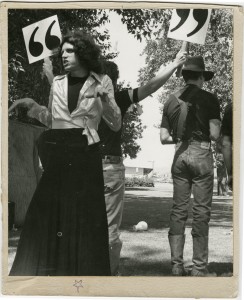New Faces: Similar Challenges

This is the sixth of a series of blog posts highlighting the ongoing work of the Documenting UO History Project within the University Archives. A major part of this project is researching and documenting the often untold and hidden histories of the university’s diverse and underrepresented communities. This year our focus will continue to highlight Black history on campus, specifically Black student activism from the 1960s to present. Prior posts can be seen here.
“It was the first time I noticed that being a black woman was going to be different here (Eugene).”
–Anetra Brown
2015 Oregon graduate and Black Student Union member Anetra Brown has remained in Eugene since graduation and has stayed connected with the University of Oregon through organizations like the Black Alumni Network, a group that has helped Brown feel more at home in Eugene. Anetra came to Eugene in September of 2011 to run on the track and field team, but academics were always her primary focus. Brown was born in San Francisco and moved to Indianapolis when she was 10. Upon her arrival to Eugene, Oregon’s lack of racial diversity was glaring. Although she describes the community as friendly, Brown says the feeling of isolation was undeniable. Through a recent oral history interview with Anetra for this project, this post highlights her specific experience at the University of Oregon and explores her reasons for choosing to remain in Eugene after graduation.
Brown said, “Living in the dorms was not the best experience, because I had a hard time finding girls I could relate to. It was the first time I noticed that being a black woman was going to be different here. Even things like hair — when I straightened my hair or even not washing my hair every day – and having to explain to roommates why I did that. It was the first time in my life where I felt different. I felt like I had to explain each thing I did. Or even not trying to come off as too aggressive in fear of being portrayed as the ‘angry black girl.’”


